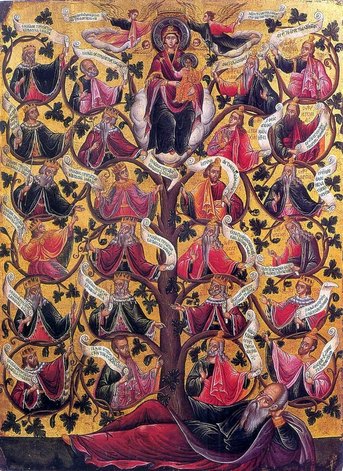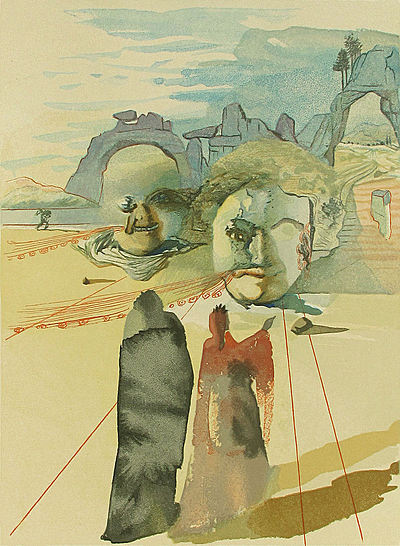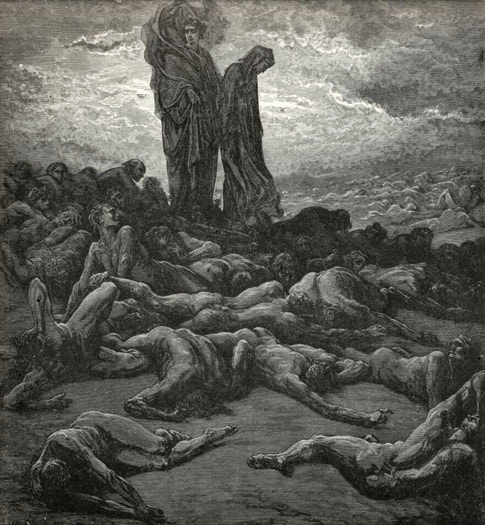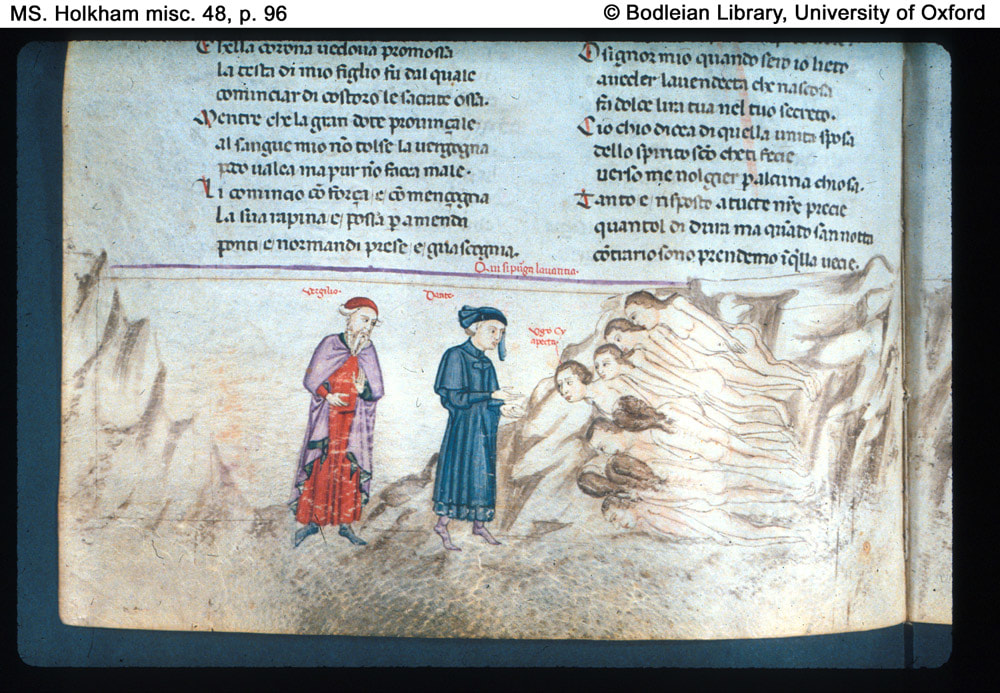As we continue along the Terrace of Avarice, we come across a familiar figure. Just as we returned to Ulysses in Canto XIX, we now go even further back, returning to the beginning of this entire journey, Inferno Canto I and the she-wolf of greed blocking the way of Dante the Pilgrim. Avarice and Greed must be feared at every level of human experience; be it ecclesiastical ladder-climbing as with Pope Adrian V, or the overwhelming desire for knowledge as with Ulysses, or the addiction for secular political power as with the descendants of Hugh Capet in this Canto XX [11 kings in all]. Dante the Poet seems keenly aware that he is walking the razor’s edge in this, his magnum opus, attempting to embrace the entirety of the known universe, secular and sacred, and the reason for life itself. The wolf of Greed can lead one astray in all manner of ways, unless discernment, humility and wisdom continually intercede.

THE ROOT OF HUGH
The medieval church celebrated the birth of Jesus Christ by remembering his lineage, focusing on “the root of Jesse” passage from Isaiah.
“There shall come forth a shoot from the stump of Jesse, and a branch shall grow out of his roots.” (Is 11:1)
The icon we see here is just one of many dating from the 12th to the 16th centuries, showing the family tree sprouting from Jesse’s loins, with the family of Christ including David, Solomon, many others and, of course, Mary the Theotokos and infant Jesus on her lap. Dante the Poet shows that Hugh Capet is profoundly aware of his “root” and the legacy that comes from this lineage:
43 'I was the root of the evil tree
Io fui radice de la mala pianta
44 that casts its shadow over all the Christian lands
che la terra cristiana tutta aduggia,
45 so that good fruit is rarely gathered there.
sì che buon frutto rado se ne schianta.
While the Root of Jesse brought salvation and hope, the Root of Hugh cast dark shadow over all Europe of death and despair. We then have a litany of offspring who ruled France, “Of me were born the Philips and the Louis,” a litany of avarice, greed, murder and betrayal. The poetry is powerful; terrible in its beauty and cadence. I believe this is the longest such soliloquy on Mt. Purgatory. Read through the list of fraud, rape, sin and shame and one has a sense of the dysfunctional political landscape that led to Dante the Poet’s exile and the wars of power politics that ravaged Europe for centuries.
And yet, in the midst of this litany we have three lines that should shock and stun us. Remember that Dante the Poet was abashed at the meddling of the Church in politics, and Boniface VIII was the epitome of such sin. Indeed, he was directly responsible for Dante’s exile from Florence, and we read in the Inferno that he will soon be joining the other popes there. And yet, in the Root of Hugh, we read that one of the actions of his lineage was to storm the castle of the 87 year old Pope Boniface VIII. They ransacked the castle, tied the old pope up and threatened to torture and kill him. In the end, they released him, but Boniface, who had reacted, surprisingly, with grace and humility to these actions, died shortly after his release as a direct result of the abuses.
 Dali: Purgatorio - Canto XX
Dali: Purgatorio - Canto XX 86 I see the fleur-de-lis [French politics] proceed into Anagni
veggio in Alagna intrar lo fiordaliso,
87 and, in His vicar, make a prisoner of Christ.
e nel vicario suo Cristo esser catto.
88 'I see Him mocked a second time.
Veggiolo un'altra volta esser deriso;
89 I see renewed the vinegar and gall--
veggio rinovellar l'aceto e 'l fiele,
90 between two living thieves I see Him slain.
e tra vivi ladroni esser anciso.
Dante the Poet has not shied away from expressing his disgust and hatred of Boniface VIII. He felt it was Boniface who made of the Tomb of Peter a sewer running with blood and feces (Paradiso XXVII 23-24). It was he who would be in Hell with the Simoniacs. And yet, and yet, the office of the Vicar of Christ must still be honored and respected, regardless of who sits upon that chair. The fact is that the anointing of each pope, in Dante the Poet’s theology, still is a sacred and holy act and the office should be treated accordingly by one and all. Dorothy Sayers expresses it beautifully:
“Nothing in Dante is more paradoxical or more magnificent than his treatment of Boniface VIII…. Christ’s Vicar is Christ’s Vicar still, identified with Him in the sacrament of his anointing; and to lay hand on him is to crucify Christ afresh. This balance of two equal and opposed indignations, [the sins of Boniface and the abuse of his office-added] both blazing and mutually unmitigated, is a triumph of the passionate intellect unsurpassed in literature and scarcely paralleled.”
I am reminded of the gleeful denigration of the Office of the President, I am reminded of the proliferation and glorification of revenge motives and movies, I am reminded of the unwillingness to forgive in today’s culture, and I ache for the paradoxical and magnificent heart of Dante today.
 Dore: Purgatorio Canto XX
Dore: Purgatorio Canto XX The Cantos continue to run together more and more as we move nearer to the top of Mt. Purgatory. The earthquake and shouts of glory will be explained and we find Virgil beginning to make his exit as the Gates of Paradise draw ever closer. Things begin to move more quickly now. Don’t go away!

 RSS Feed
RSS Feed
